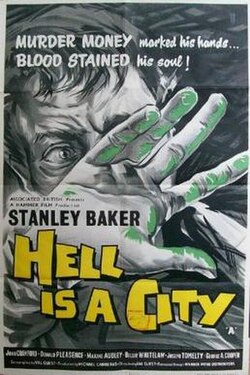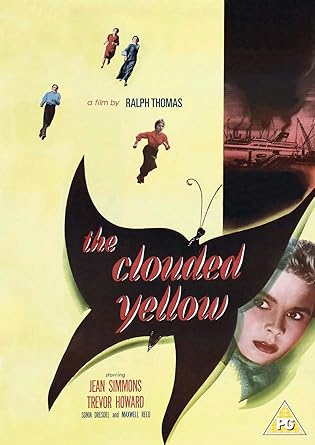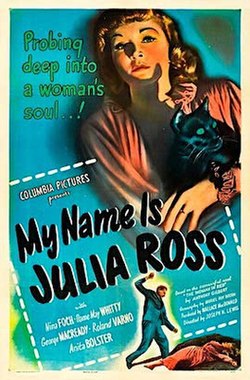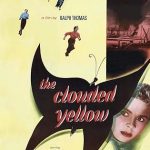
Film Noir Flashback/The Clouded Yellow
June 1, 2025
Film Noir Flashback/Hell is a City
July 28, 2025I post reviews (Film Noir Flashback) of movies from, and inspired by, Hollywood’s Golden Age of Noir, the 1940s and 1950s. I am a film noir enthusiast. Maybe, like me, you are looking to enjoy films that are different, or of a different era. Films you may not have seen, ones encompassing cynical detectives, seductive femme fatales, flawed sidekicks all tossed together into intricate plots. Not forgetting the snappy dialogue too.
Backstory: Film Noir has its roots in German expressionist cinematography and American crime fiction. During the 1930s Hollywood became a perfect storm of film artists fleeing the threat of Nazi Germany, emigrating to America, and specifically to the Film studios of Hollywood. This included great directors such as Fritz Lang, Jaques Tourneur, Michael Curtiz and Robert Siodmak.
This new dramatic visual style combined with American hardboiled crime stories (noir fiction), emerged during the Great Depression and produced many classic noirs. Some of these writers include: Raymond Chandler, James M. Cain, Dashiell Hammett, Patricia Highsmith, Jim Thompson and Mickey Spillane.
I hope to showcase some of these memorable noir movies here for you. And advance apologies for a mixture of British and US English occasionally and potential spoilers, although I will always try to avoid revealing the full ending.
Inspired by hardboiled detective stories and film noir, I have written the Sterling Private Investigator Series, set in present-day London. I have also posted a link to some of my books at the bottom of the page. For more of my Film Noir Flashback blogs: https://johnkempauthor.com/blog-film-noir-reviews/
Today’s Film Noir Flashback is:
Alias Nick Beal
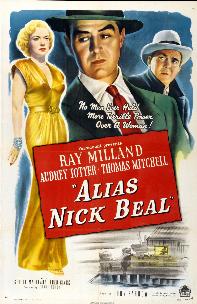
“The devil is in the details”
Film Studio: Paramount Pictures 1949 B&W
Director: John Farrow
Original Music: Franz Waxman
Cinematography: Lionel Lindon
Film Editor: Eda Warren
Story: Mindret Lord
Screenplay: Jonathan Latimer
Main Actors: Ray Milland, Audrey Totter, Thomas Mitchell
Produced by: Endre Bohem
Run time: 93 minutes
Preview
Courtesy of Wikipedia
Alias, Nick Beal is a 1949 American horror, mystery film starring Ray Milland, Audrey Totter and Thomas Mitchell (although third-billed, Mitchell plays the leading role). Directed by John Farrow, it is a retelling of the Faust myth, and is also known as Dark Circle, Strange Temptation and Alias Nicky Beal.
A 1949 review of the film in The New York Times held that, “Due to the fine acting and the wily direction, the story plays exceptionally well, but the script tends to be somewhat wobbly and indecisive upon reflection.” A contemporary review by Fim4 contended “Milland is outstanding as the personification of evil—a talent often obscured by his charm and early juvenile good looks.”
Synopsis
The Alias Nick Beal credits roll and we are assaulted by thunderclaps, lightning and dramatic music… This is a Faustian tale, hence the light show overhead and the dramatic score. One or two few unbelievable parts but an absorbing story, nonetheless.
Nick Beal (played by Ray Milland) is Satan’s representative or worse, the devil himself! Whichever one it is, he provides the commentary as we watch Joseph Foster (Thomas Mitchell), flanked by umbrella-holding dignitaries, proceed up the steps to the Governor’s mansion:
“In every man there is an imperfection, a fatal weakness, a seed of destruction. You discovered that, Foster, when you traded principles for personal glory. When you sacrificed integrity for power. You discovered that in eight short months climbing to a governor’s mansion from a District Attorney’s office.”
And the devilish Nick Beal is going to find – and test – that weakness.
Presently, Joseph Foster is an honest law-abiding district attorney. (Some might say this is one of those unbelievable bits…). A man who wants to bring the criminal underworld to heel, clean it up and catch its ringleader, a man called Frankie Faulkner (Fred Clark) and his cohort, Hanson, who make money from protection rackets. Foster fails to obtain the incriminating evidence (“the records”) to convict them, however.
In the office at the Garfield Boys Club, Foster, in a mixture of frustration and despair, says, “I’d give my soul to nail him” (referring to Hanson). A moment later, a small boy enters the office and says, “A man told me to give this to you.” Foster opens the note; an invitation to come to the China Coast Cafe (“if he wants to nail Hanson”). Surprised, the Reverend Thomas Garfield (George Macready) says, “It’s almost as if he heard you.” Seems like he did.
The rendezvous is a joint on French Street by the M & R Wharf. A neon light flickers on and off as the mist swirls around. We hear an eerie whistling sound from the silhouetted figure of Nick Beal who appears from out of the fog. And we immediately see the superb Ray Milland is a perfect fit to play this character, appearing at times dark and sinister but also smooth and charming too, which makes him all the more creepy.
Entering the bar, the mysterious stranger gives his order before sitting and scanning a newspaper. The curious Foster arrives shortly after. After they drink up, Nick Beal leads Foster to the cannery. Pulling open an office drawer he presents a record logbook with Hanson’s signatures at the bottom of each page; guilt edged evidence. Beal disappears and Foster slips away with the records under his arm. Whether he knows it or not yet, Foster has made a Faustian bargain… Next, we see a newspaper headline announcing that Hanson has been convicted. Foster may have got his man but he might have to surrender his soul…Eww…
Foster’s colleagues visit and encourage him to run for governor. During their attendance at his home, Nick Beal makes a mysterious appearance… Is he here to collect on the deal? Beal refuses an offered payment but learns that Foster plans to divulge his deceit to his colleagues (in stealing the logbooks). A reprieve of sorts. Old Nick gives him thirty thousand dollars for his campaign and before Foster can give it back, he has gone. Into the darkness presumably.
We are introduced to Audrey Totter’s character – Donna Allen – as she is being thrown out of a bar and to the ground. We can see she has hit rock bottom and not just metaphorically. She looks up to see Nick Beal who offers a hand up (though, it isn’t one without payback). She may be a fallen woman but she has qualities that he can use… the same wiles to tempt Foster away from his wife and destroy their marriage.
Beal tempts her with fine jewellery, nice clothes (all delivered to the door of her shiny new apartment). Sceptical, she innocently accepts his offer. And why wouldn’t she? It beats having drinks thrown in your face, scrabbling around on the floor in catfights and being rough-housed out of local bars.
Foster gets elected and has his head turned by Donna Allen, whereby his marriage hits the rocks. However, Foster resigns as governor; his troubled conscience can’t abide the corruption and duplicity he has partaken in, albeit all influenced by Nick Beal. His soul relinquished, he leaves with Nick Beal for The Island of Lost Souls but his wife and the reverend have not given up on him quite yet…
Things to like
“Gimme a cigarette,” she demands from the barman. Suddenly, an ashtray is thrust along the counter (like one of those whisky glasses careering along the bar in an old western movie), The glass stops just short of her hand. She jolts. Her eyes widen and her mouth drops open. Momentarily fixated on the glass, she clutches onto the fur lapels of her coat; her worst fears manifested. The camera slowly pans around to the other end of the bar. The menacing figure of Old Nick is hunched over at the corner of the bar; he is cold and unsmiling. It looks like she’s not going to catch that train…
Ray Milland’s performance. Nick Beal comes and goes like a light breeze rolling in through an open curtain. No windows or doors needed. Whether whistling from within a heavy fog and suddenly appearing against the slate-grey docks or disappearing from an apartment without a fire escape. Sometimes, we notice him before his contemporaries (over their shoulder etc.) or sometimes at about the same time. Usually, he’s in the background before entering the conversation. These appearances keep us off-guard and add a clever element of (“evil is all around”) surprise to many of Ray Milland’s entrances.
The musical score by Franz Waxman. Without the eerie, melodramatic and ethereal music in Alias Nick Beal , the film wouldn’t have have the same thrill or feel. Waxman provided music for many horror and suspense films including Bride of Frankenstein from 1935. This culminated in 1940s Rebecca. He went on to provide the score to Sunset Boulevard in 1950 as well.
Quotes
(Nick Beal puts a sable fur coat across the shoulders of Donna Allen)
Donna Allen: “What have I got to do? Murder?”
Nick Beal: “Just the opposite. Reform work in a boys club.”
***
Nick Beal: “I’d like two drinks. separate drinks brought to this table and some ginger ale and a small glass of Barbados.”
Barman: “Barbados?
Nick Beal: “Rum, my friend. A dark pungent rum.”
barman: “We ain’t got none.”
Nick Beal: “I think you have. A square bottle. You’ll find it.”
***
Donna Allen: “I’ve got a railway ticket to nowhere. The train leaves in exactly… What’s the time?”
Barman: “Ten-fifty.”
Donna Allen: Twenty minutes. I’m going to disappear in twenty minutes.”
***
Donna Allen: “Brother. How corny can we get?”
Nick Beal: “Never mind that. Just remember those lines.”
Donna Allen: “Yeah, but will he remember his?”
Must-see scene
Summary
This cautionary tale is loosely based on the German tale of Faust. Unhappy with his life, Faust summons the devil hoping to indulge in the pleasures of the world. His wish is duly granted and a deal is made, but at the end of the term, Faust’s soul will be claimed and he will be enslaved. So, the story goes.
Alias Nick Beal is a film noir infused with these supernatural elements. John Farrow brought out great performances from the cast and the cinematographer created an atmosphere that almost feels like a gothic London noir with its austere settings and darkly lit scenes. Ray Milland at this point, was a leading man. This must be one of his best performances too (though he had many, I’m thinking of his Oscar-winning performance in Lost Weekend and a star performance in Dial M for Murder). Of course, The Big Clock is another classic noir. Audrey Totter is always worth watching and plays a key role here.
This is an engaging noir that might have you hesitating (afterwards), if and when someone is offering you a deal… Be sure to read the contract – and small print – very carefully! Lesser known maybe but a highly recommended watch.
For more of my Film Noir Flashback blogs: https://johnkempauthor.com/blog-film-noir-reviews/
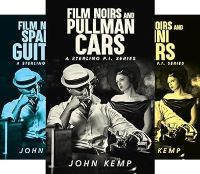
“An interesting detective story, with dry as a bone dialogue, that ticks all the film noir boxes. A great fun read.” ~ Film Noirs and Doused Cigars.
USA Link: Film Noirs & Doused Cigars– Audio: https://tinyurl.com/ythp5nsy eBook: https://tinyurl.com/fprdmsvb Paperback: https://tinyurl.com/2d7aeynd
UK Link: Film Noirs & Doused Cigars – eBook: https://tinyurl.com/4d84n4wx Paperback: https://tinyurl.com/bd2y4yra

